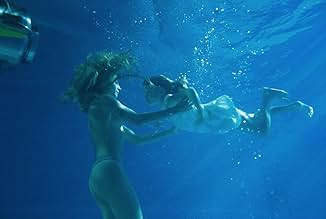Varias vidas coinciden en una isla, conectadas por un autor cuya novela se entrelaza con su propia vida.Varias vidas coinciden en una isla, conectadas por un autor cuya novela se entrelaza con su propia vida.Varias vidas coinciden en una isla, conectadas por un autor cuya novela se entrelaza con su propia vida.
- Dirección
- Guionista
- Elenco
- Premios
- 11 premios ganados y 18 nominaciones en total
María Álvarez
- Enfermera
- (as María Alvarez)
Javier Coromina
- Camarero Chiringuito
- (as Javier Corominas)
Alesandra Álvarez
- Luna 1 año
- (as Alesandra Alvarez)
José Ferreira
- Emplastro
- (sin créditos)
- Dirección
- Guionista
- Todo el elenco y el equipo
- Producción, taquilla y más en IMDbPro
Opiniones destacadas
I found this film absolutely terrific. Ik know there's a lot of sex in it and yes, there are a lot of suspicious coincidences, but I looked past that.
For starters, I loved the story, it wasn't boring at all, despite what some may say. It was a sort of twisty fairytale to me, just like 'Los Amantes del Circulo Polàr' was. I love good fairy tales!
The acting was very good by most actors (I love you Najwa!), and good by the others. Even the girl that played Luna was convincing.
The film has a lot of explicit scenes (sexual and non-sexual) but besides from that Médem accomplishes to put a lot of suggestion in it (sexual and non-sexual). If you watch it attentively and past merely what you see, you will notice the subtlety of the characters and story.
Last of all i would like to say that the English title (Sex and Lucia) is an abomination to the original title (Lucia y el Sexo). The word are the same, but the word order has flipped, which gives the title a whole other meaning, to my opinion. The film is about Lucia and the meaning sex has in her life and the life of others. It is not about sex and the way Lucia handles with it. The meaning of film titles is often lost in translation (no pun intended). Why can't American (and other) people keep the original title? We can in Belgium.
A la proxima
For starters, I loved the story, it wasn't boring at all, despite what some may say. It was a sort of twisty fairytale to me, just like 'Los Amantes del Circulo Polàr' was. I love good fairy tales!
The acting was very good by most actors (I love you Najwa!), and good by the others. Even the girl that played Luna was convincing.
The film has a lot of explicit scenes (sexual and non-sexual) but besides from that Médem accomplishes to put a lot of suggestion in it (sexual and non-sexual). If you watch it attentively and past merely what you see, you will notice the subtlety of the characters and story.
Last of all i would like to say that the English title (Sex and Lucia) is an abomination to the original title (Lucia y el Sexo). The word are the same, but the word order has flipped, which gives the title a whole other meaning, to my opinion. The film is about Lucia and the meaning sex has in her life and the life of others. It is not about sex and the way Lucia handles with it. The meaning of film titles is often lost in translation (no pun intended). Why can't American (and other) people keep the original title? We can in Belgium.
A la proxima
(8/10) Refreshing, delightful, sexy. moving and thought-provoking movie from Spain. Not really porn (as the title might suggest) although there is some very artistic explicitness. It is movies like this one that remind us that European cinema can scale the emotional dilemmas and mountains of a story where other films look at a storyline in terms of physical developments. Lucia, a young waitress in Madrid, falls completely in love with a writer. After a period of blissful togetherness, something from his past pulls him in two directions. We are caught up in his moral dilemma, of not wanting to lose the wonderful gift he has found and yet not wanting to be untrue to himself. The semi-autobiographical novel he is writing pulls together the story and the emotions and hopes of the characters and introduces ideas that enable them to heal some of their hurt. A central idea is that of finding a hole (symbolically on the sandy beach) where, after reaching the end of the story, you can jump back into the middle. That way you can try an make things turn out better ("If you give me time", says Lorenzo, Lucia's boyfriend.) A more mature and rounded work than the Director's earlier "Lovers of the Arctic Circle", Sex and Lucia combines wonderful acting, a great story, innovative cinema and spine-tingly beautiful photography. One of my favourite films of the year.
Stories told in a so-called "magical realism" style like this film can be very tricky. The story and the characters need to be very strong to sustain all the twists of the plot and I don't think this was pulled off here. I was disappointed, as I'd enjoyed Medem's previous film Los Amantes del Circulo Polar, where the passionate love story seemed a lot more genuine and the tragic ending seemed to fit better with the theme of fate playing with people's lives than Lucia y el sexo's tragic-to-happy contortions.
Also, while the female characters were all charming and sexy, the male roles were really poor and unconvincing. What on earth did Lucia see in Lorenzo? There isn't enough to justify her endurance and patience with him. Their whole love story seems artificial from the inception, it seems there was too much work on the symbolism of their relationship - the tormented writer and storyteller, the reader and savior (Lucia as a ray of sunshine) - rather than on the real intensity of feeling between two people. The sex scenes are too stylish and sleek to be really passionate. Everyone is good looking and well dressed, they live in nice apartments, exist in a bubble where the society around them doesn't seem to affect them, this is obviously purposefully so and ideally you wouldn't mind that lack of realism if the story was engrossing enough, which it isn't.
The entire plot seems to revolve around the concept of the ability to deal with tragic fateful events by rewriting, literally and metaphorically, one's own life story. But the final optimism comes across as too artificial. The plot does not resolve the fate of the child Luna, Lorenzo's daughter. The tragedies seem more like a prop, a trick to demonstrate how love can conquer guilt, remorse and failure. They're not given enough weight. People slash their wrists or throw themselves under buses easier than they cry, then we're supposed to believe they can just forget and forgive and live happily ever after.
The director says he wanted to make everything "light" in this film, after the experience with the previous one. But I think he overdid it! There is a bit too much of the French 'Amelie' in Lucia's character, she is more like a beautiful fairy than a real person. Elena, too, is more a symbol of caring and nurturing (motherhood, cooking, taking care of Lucia) than a real grieving mother. Her lack of anger and bitterness is not very believable. The whole escapist symbol of the floating island becomes annoying after a while. It functions on the characters like a drug inducing apathy and oblivion, more of a way of avoiding pain than confronting it. But it's not that, it's the way in which it's presented and wrapped up at the end that really disappoints - too fancy and too abstract to really work.
It's not a bad film. It's full of eye candy - the spectacularly gorgeous Paz Vegas, the island, the photography - and it is well directed and well acted overall. But without all that, the story itself wouldn't really be worth much.
Also, while the female characters were all charming and sexy, the male roles were really poor and unconvincing. What on earth did Lucia see in Lorenzo? There isn't enough to justify her endurance and patience with him. Their whole love story seems artificial from the inception, it seems there was too much work on the symbolism of their relationship - the tormented writer and storyteller, the reader and savior (Lucia as a ray of sunshine) - rather than on the real intensity of feeling between two people. The sex scenes are too stylish and sleek to be really passionate. Everyone is good looking and well dressed, they live in nice apartments, exist in a bubble where the society around them doesn't seem to affect them, this is obviously purposefully so and ideally you wouldn't mind that lack of realism if the story was engrossing enough, which it isn't.
The entire plot seems to revolve around the concept of the ability to deal with tragic fateful events by rewriting, literally and metaphorically, one's own life story. But the final optimism comes across as too artificial. The plot does not resolve the fate of the child Luna, Lorenzo's daughter. The tragedies seem more like a prop, a trick to demonstrate how love can conquer guilt, remorse and failure. They're not given enough weight. People slash their wrists or throw themselves under buses easier than they cry, then we're supposed to believe they can just forget and forgive and live happily ever after.
The director says he wanted to make everything "light" in this film, after the experience with the previous one. But I think he overdid it! There is a bit too much of the French 'Amelie' in Lucia's character, she is more like a beautiful fairy than a real person. Elena, too, is more a symbol of caring and nurturing (motherhood, cooking, taking care of Lucia) than a real grieving mother. Her lack of anger and bitterness is not very believable. The whole escapist symbol of the floating island becomes annoying after a while. It functions on the characters like a drug inducing apathy and oblivion, more of a way of avoiding pain than confronting it. But it's not that, it's the way in which it's presented and wrapped up at the end that really disappoints - too fancy and too abstract to really work.
It's not a bad film. It's full of eye candy - the spectacularly gorgeous Paz Vegas, the island, the photography - and it is well directed and well acted overall. But without all that, the story itself wouldn't really be worth much.
This is really one of the better constructed movies I've seen in a while.
Both the storytelling and style of the movie can be called unique.
It starts mixing reality with fiction and its hard to tell what really happened and what didn't. It features lots of 'what-if' themes and the story is being rewritten in the characters mind, also with lots of symbolism, mainly with the moon and the water. It doesn't make this the most accessible movie but then again, you don't ever have to watch an European movie for its accessibility.
Things start off quite slow but as the story develops the story gets more and more complicated and non-linear, when the line between fiction and reality gets blurred more and more. It does make the movie hard to follow at times but it at the same time makes the movie more interesting to watch and enables everybody start to define things on their own. You of course have to be open to these sort of movies though. Also the very explicit nudity isn't just for everybody.
Sex plays a key part in the movie. It helps to tell the story and plays a significant role in the story lines and help to indicate when things are truth or fiction. Never before has sex played such a key part in the storytelling of a movie.
This movie is always presented as a Paz Vega but this movie it's main character is in my opinion played by Tristán Ulloa. He's the writer, were the entire movie involves around. The story is mostly set inside his head. The three main actors (Paz Vega, Tristán Ulloa, Najwa Nimri) of the movie are really good and carry the entire movie.
Visually the movie is really great and impresses just as much as the storytelling of the movie. The camera-work and colors are really great and create a very unique atmosphere for the movie. It helps to make "Lucía y el sexo" an even bigger and more enjoyable movie to watch, visually.
Those who are open for an unique, one of a kind, unusual movie experience, will surely be delighted with this magnificent beautiful looking and constructed movie.
9/10
http://bobafett1138.blogspot.com/
Both the storytelling and style of the movie can be called unique.
It starts mixing reality with fiction and its hard to tell what really happened and what didn't. It features lots of 'what-if' themes and the story is being rewritten in the characters mind, also with lots of symbolism, mainly with the moon and the water. It doesn't make this the most accessible movie but then again, you don't ever have to watch an European movie for its accessibility.
Things start off quite slow but as the story develops the story gets more and more complicated and non-linear, when the line between fiction and reality gets blurred more and more. It does make the movie hard to follow at times but it at the same time makes the movie more interesting to watch and enables everybody start to define things on their own. You of course have to be open to these sort of movies though. Also the very explicit nudity isn't just for everybody.
Sex plays a key part in the movie. It helps to tell the story and plays a significant role in the story lines and help to indicate when things are truth or fiction. Never before has sex played such a key part in the storytelling of a movie.
This movie is always presented as a Paz Vega but this movie it's main character is in my opinion played by Tristán Ulloa. He's the writer, were the entire movie involves around. The story is mostly set inside his head. The three main actors (Paz Vega, Tristán Ulloa, Najwa Nimri) of the movie are really good and carry the entire movie.
Visually the movie is really great and impresses just as much as the storytelling of the movie. The camera-work and colors are really great and create a very unique atmosphere for the movie. It helps to make "Lucía y el sexo" an even bigger and more enjoyable movie to watch, visually.
Those who are open for an unique, one of a kind, unusual movie experience, will surely be delighted with this magnificent beautiful looking and constructed movie.
9/10
http://bobafett1138.blogspot.com/
Written reality. I had the unexpected pleasure of seeing this soon after Ruiz's Proust. Both about writers creating a life.
Time folding. Narrative layers.
The three sisters from 'Alice in Wonderland,' here named Alsi/Elana, Lucia (the Alice, an anagram, in fact one that Carroll used) and Belin. The story is to Alice, for Alice, about Alice and generates the world that Alice lives in. The lighthouse and hole.
Its less than intelligent in the level of the story: lust drives meaning, but that's because the written novel is at that vulgar level. This film starts slow and ordinary, just as the novel within. But we soon weave all sorts of ambiguous narrative threads, each creating the other. The last half of the film is a bedtime story, a novel, a suicide note, a coma-induced dream, a recipe, an internet communication, a climax-induced hallucination, a blindfolded taste.
A man loves three women. Another man mirrors him. Lots of coupling, ethereal angst,
Two of the sisters plus the author (and his double), all possibly dead (all possibly fictional), on the island of conception. And the story starts again halfway.
Some lightly nuanced direction here. Endearment without cloying. The only thing in this film that is not sensually romantic is that the computer is a PeeCee and not a Mac. You'd think they'd know.
Ted's Evaluation -- 3 of 4: Worth watching.
Time folding. Narrative layers.
The three sisters from 'Alice in Wonderland,' here named Alsi/Elana, Lucia (the Alice, an anagram, in fact one that Carroll used) and Belin. The story is to Alice, for Alice, about Alice and generates the world that Alice lives in. The lighthouse and hole.
Its less than intelligent in the level of the story: lust drives meaning, but that's because the written novel is at that vulgar level. This film starts slow and ordinary, just as the novel within. But we soon weave all sorts of ambiguous narrative threads, each creating the other. The last half of the film is a bedtime story, a novel, a suicide note, a coma-induced dream, a recipe, an internet communication, a climax-induced hallucination, a blindfolded taste.
A man loves three women. Another man mirrors him. Lots of coupling, ethereal angst,
Two of the sisters plus the author (and his double), all possibly dead (all possibly fictional), on the island of conception. And the story starts again halfway.
Some lightly nuanced direction here. Endearment without cloying. The only thing in this film that is not sensually romantic is that the computer is a PeeCee and not a Mac. You'd think they'd know.
Ted's Evaluation -- 3 of 4: Worth watching.
¿Sabías que…?
- TriviaSome of the most sexual explicit content was made by doubles, not by the main actors.
- ErroresA full moon between two buildings is shown during midday when Lorenzo meets his daughter Luna for the first time - which is astronomically impossible.
- Créditos curiososCredits scroll in the opposite direction.
- Versiones alternativasThe US cut removes most of the frontal nudity and runs approximately 2 minutes shorter.
- ConexionesFeatured in Brows Held High: Room in Rome (2013)
- Bandas sonorasUn Rayo de Sol
Written by Daniel Vangarde (as Vangarde), Claude Carrère and Amado Jaén (as Jaen)
(c) Bleu Blanc Rouge Editions Soc - Editions Productions Zagora
Ediciones Musicales Clipper's, S.L.
Selecciones populares
Inicia sesión para calificar y agrega a la lista de videos para obtener recomendaciones personalizadas
- How long is Sex and Lucía?Con tecnología de Alexa
- What are the differences between the R-Rated and Unrated Version?
Detalles
- Fecha de lanzamiento
- Países de origen
- Sitio oficial
- Idiomas
- También se conoce como
- Sex and Lucía
- Locaciones de filmación
- Productoras
- Ver más créditos de la compañía en IMDbPro
Taquilla
- Total en EE. UU. y Canadá
- USD 1,594,779
- Fin de semana de estreno en EE. UU. y Canadá
- USD 47,591
- 14 jul 2002
- Total a nivel mundial
- USD 7,640,680
- Tiempo de ejecución2 horas 8 minutos
- Color
- Mezcla de sonido
- Relación de aspecto
- 2.35 : 1
Contribuir a esta página
Sugiere una edición o agrega el contenido que falta

Principales brechas de datos
What is the streaming release date of Lucía y el sexo (2001) in Brazil?
Responda


























